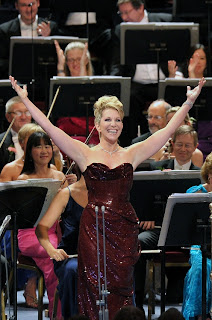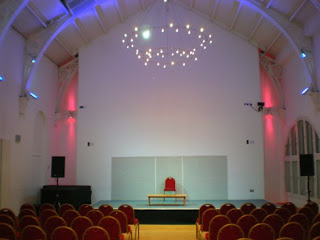In Sibelius’s Seventh Symphony, that is (and only connect: Paavo was left-handed and so is Donald). I flew up to Inverness for a mere 20 minutes’ talk on this and Sibelius’s links with Beethoven, very much interconnected in the BBC Scottish Symphony Orchestra’s programme with mighty Donald (how lucky they are in the commitment to his homeland of one of the world’s best conductors).
The flight passed over snowy Cairngorms and flights of geese
beneath before a taxi sped me to the town on the river Ness, rushing at high
level past my hotel and the Eden
Court Theatre
on the other side where the concert was held. The place enchanted me in the
bright, cold weather with only the occasional snowstorm, enhanced by the
knowledge of those mountains to the south and no major settlements to the
north.
I last came here with dearest Lottie in 1983 to join the
Scottish Chamber Orchestra on its steam-train trip to the Kyle of Lochalsh (the
best perk of being the SCO’s ‘student publicity officer’). We stayed in the
youth hostel which, my taxi driver told me, has since burnt down, leaving
enough of a shell to save and within which, perhaps, to rehouse the museum,
currently stuck in a concrete box. His lilting accent reminded me of the
Invernessian charm. News of my business there, and mention of Sibelius, led him
to tell me of a Scot he knew called Greig who lived in Norway and
reversed the e and i.
We could live here, I foolishly thought, enticed by the
nearness of wild nature and the fact that on the Saturday morning before my
early afternoon flight I walked half way to Loch Ness along river and canal,
greeting lots of locals – cheery at the sun, no doubt – with their dogs: any
town where the country is so imminent has my vote. Lewes would probably be a
more practical suggestion but heck, a castle here wouldn’t cost half our flat thanks
to the insanity of the London
market.
Alas, I left my camera behind and my mobile phone was in
transit from Aix-en-Provence,
where it had fallen out in a taxi, so no shots of the fast-flowing river or the
thousands of snowdrops and crocuses along the way. Here’s a generic photo of the
Eden Court
– no architectural masterpiece, but you get a sense of its riverside setting.
As for talk and concert, I thought I’d better draw the
threads suggested by the programme together: Sibelius and Beethoven, the
painstaking path both took to the final results (Beethoven 9 finale, Sibelius 5
versions 1 and 3). Runnicles’ coup, after a first half balancing a Sibelius
Finlandia which was never overbearing even from my second-row seat with an
intonation-perfect, meaningful-in-every –note Alina Pogostkina as soloist in
the Beethoven Violin Concerto (still boring to me despite that), was to follow
the end of Sibelius 7 with Beethoven’s Leonora Overture No. 3 (the same C
major). My blind spot for so many Beethoven scores meant I still didn’t find it
as meaningful as the Sibelius symphony, but that was a beauty of a performance, every
tricky tempo change seamlessly negotiated and the climaxes falling where they should. Delighted to find this sketch on sibelius.fi.
Predicting success from what I knew of Runnicles' flexible style, I’d made an unfavourable comparison in the talk with Rattle’s
Sibelius cycle so fresh in my head: this is a work that Donald knows how to
negotiate, on a first attempt by the way, and Sir Si, for all his strengths in Sibelius 1, 2 and 4, doesn’t. A
lady in the interval ticked me off for setting one above the other, and she did
it with typical Scots abruptness, not prepared to hear me out. But against
that, there were five folk with whom I had really lovely conversations,
including the local worthy who remembered Neeme Järvi unveiling the plaque to
the new theatre. That wasn’t all to the good: the theatre had lost several
hundred seats in the revamp, meaning that they couldn’t afford many visiting
orchestras because they couldn’t sell as many tickets as they had before.
Still, this event was packed. A fine crowd; they deserve more music up there. And I loved meeting the very thoughtful and friendly Donald as well as Alina (pictured above) afterwards, thanks to the kind offices of the excellent Andrew Trinick. I mentioned the superb performance she gave of Widmann's Violin Concerto in Bamberg and our conductor was keen to hear a recording of it.
Now I’m in Glasgow after another talk, another great concert, enjoyed with the adored godchildren studying here, Evi and Alexander. I hadn’t intended to write about it but was so impressed by the sound coming from the orchestra under Mexican conductor Carlos Miguel Prieto that I just have, with a disclaimer, for The Arts Desk.
Still, this event was packed. A fine crowd; they deserve more music up there. And I loved meeting the very thoughtful and friendly Donald as well as Alina (pictured above) afterwards, thanks to the kind offices of the excellent Andrew Trinick. I mentioned the superb performance she gave of Widmann's Violin Concerto in Bamberg and our conductor was keen to hear a recording of it.
Now I’m in Glasgow after another talk, another great concert, enjoyed with the adored godchildren studying here, Evi and Alexander. I hadn’t intended to write about it but was so impressed by the sound coming from the orchestra under Mexican conductor Carlos Miguel Prieto that I just have, with a disclaimer, for The Arts Desk.
Work proceeds inspiringly on listening to all the Sibelius
4s for Radio 3’s Building a Library: halfway through I’ve found one which will
be hard to beat, a real surprise to me at any rate. But I can’t say more about the performances;
suffice it to say that being immersed in this dark, if not black, work has not
been depressing – past an early dip, extrovert performances raised my spirits
and the perfect construction amazes me more and more.
Another seminal work of around the same time, Schoenberg’s Three Pieces for Piano Op. 11, was beautifully argued in word and performance by young Jordanian-born,
British-trained pianist Karim Said (pictured above) the other week. The circumstances were
remarkable: an evening at Lady Valerie Solti’s house, organized by Norman
Rosenthal. Said was promoting his new album on Opus Arte, hence my invitation
from the recording company.
What artistic treasures – one never knows if it’s legit to
list them or not – and what unshowy good taste, much like the lady herself. She
came to the rescue when I asked where Strauss, at whose funeral Solti conducted
the Trio from Der Rosenkavalier where
the ladies famously broke down one by one and came back in again to reach the
end - was among the pictures in the music room. The
photograph in question – the old composer on his 85th birthday
celebrations working with young Georg (Valerie referred to him throughout as ‘Solti)
– seemed to have disappeared. She found me an unsigned copy, wonderful to see. Naturally it's not available, but I think - I may be wrong - that this photo of Strauss conducting also dates from the time of the celebrations.
A portrait of Thomas Mann led to a conversation about Joseph
and his Brothers, which I’ve just begun and, contrary to fearful expectations,
am bathing in its serene mythic re-interpretation. ‘Solti’ read one of its four
books every summer holiday, and when he finished, went straight back to the
beginning. I can already understand why.
Said’s concerts will always be a success if he presents
them as revealingly as he did this one, explaining why the Schoenberg shouldn’t
be seen as difficult music: how it should waltz and entertain. In that small
space, the resonance of the Steinway could be overwhelming, and it is perhaps a
little too often on the CD too; a few more genuine pianos wouldn’t go amiss.
But there’s no doubt about Ashkar’s lively intelligence, re-creative art and
knack of good programming. The Berg Sonata actually made sense and flew by for
once rather than sounding like an improvisation, though the improvisatory
quality was still there and the becalmed ending seemed like the goal of all its
labours. Fabulous neoclassical Enescu, too. The promotion did its work: I’ll be
seeking Said out from now onwards.












.jpg)


































